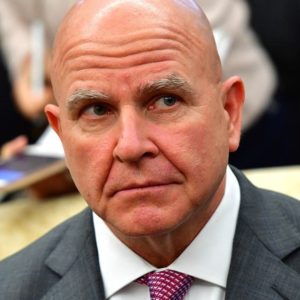War Studies Program
Learn the theory, practice, organization, and control of war and military forces.
Summer 2021
Online Seminar Series
Is conflict between the United States and China inevitable? Is China’s aggressive rise a sign of its strength – or its weakness? Do democracies have an edge over autocracies in great-power rivalries? Or will China’s investment in technology and economic power enable it to outcompete the U.S.? This online course, led by noted national security experts and practitioners, will illuminate these and other debates about strategic competition between the U.S. and China.
Images: U.S. President Donald Trump and China’s President Xi Jinping make joint statements in Beijing, China, November 9, 2017 | Courtesy of National Committee on US China Relations
Dan Blumethal & HR McMaster on the China nightmare

Dan Blumenthal is a senior fellow at the American Enterprise Institute, where he focuses on East Asian security issues and Sino-American relations. Mr. Blumenthal has served in and advised the US government on China issues for more than a decade.

Dan Blumenthal is a senior fellow at the American Enterprise Institute, where he focuses on East Asian security issues and Sino-American relations. Mr. Blumenthal has served in and advised the US government on China issues for more than a decade.
Before joining AEI, Mr. Blumenthal served as senior director for China, Taiwan, and Mongolia at the US Department of Defense. He served as a commissioner on the congressionally mandated US-China Economic and Security Review Commission from 2006 to 2012, and he was vice chairman of the commission in 2007. He also served on the Academic Advisory Board of the congressional US-China Working Group.
Mr. Blumenthal is the author of “The China Nightmare: The Grand Ambitions of a Decaying State” (AEI Press, November 2020) and coauthor of “An Awkward Embrace: The United States and China in the 21st Century” (AEI Press, November 2012).
He has testified before Congress and has been published in The Atlantic, Commentary, Foreign Policy, The Hill, Los Angeles Times, The National Interest, National Review, The New York Post, The New York Times, Newsweek, RealClearWorld, and The Wall Street Journal, among other outlets. His broadcast appearances include C-SPAN, Yahoo News, Bloomberg Radio, and many top-rated talk radio programs.
Mr. Blumenthal has a J.D. from Duke Law School, an M.A. from the School of Advanced International Studies at Johns Hopkins University, and a B.A. from Washington University in St. Louis. He also attended Capital Normal University in Beijing, China, where he focused on Chinese language studies.

Christian Brose is a Senior Fellow at the Carnegie Endowment for International Peace and the Head of Strategy at Anduril Industries, prior to which he served as staff director of the Senate Armed Services Committee. He was also responsible for leading the production, negotiation, and passage of four National Defense Authorization Acts, which set policy and authorized spending for all U.S. national defense activities.

Christian Brose is the Head of Strategy at Anduril Industries, prior to which he served as staff director of the Senate Armed Services Committee. During his tenure in Committee, he was responsible for leading the production, negotiation, and passage of four National Defense Authorization Acts (FY16-19), which set policy and authorized spending for all U.S. national defense activities. He was also a Senior Fellow at the Carnegie Endowment for International Peace.
Mr. Brose conducted official travel to more than 60 countries during his work in the Senate. From 2008-09, he was senior editor of Foreign Policy magazine. Prior to that, he served as policy adviser and chief speechwriter to Secretary of State Condoleezza Rice from 2005-08, working as a member of the Secretary’s Policy Planning Staff and supporting the Secretary on regular foreign travel. He began his career in public service as a speechwriter for Secretary of State Colin Powell.
He is the author of The Kill Chain: Defending America in the Future of High-Tech Warfare, a timely wake-up call about how new technologies are threatening America’s military might.
Mr. Brose studied political science at Kenyon College and international economics at the Johns Hopkins University’s School of Advanced International Studies.

Matthew Kroenig is a Professor in the Department of Government and the Edmund A. Walsh School of Foreign Service at Georgetown University. A 2019 study in Perspectives on Politics ranked him as one of the top 25 most-cited political scientists of his generation. He has served in several positions in the U.S. Department of Defense and the intelligence community in the Bush and Obama administrations.

Matthew Kroenig is a Professor in the Department of Government and the Edmund A. Walsh School of Foreign Service at Georgetown University. A 2019 study in Perspectives on Politics ranked him as one of the top 25 most-cited political scientists of his generation. Dr. Kroenig is the author or editor of seven books, including The Return of Great Power Rivalry: Democracy versus Autocracy from the Ancient World to the US and China, The Logic of American Nuclear Strategy: Why Strategic Superiority Matters, and Exporting the Bomb: Technology Transfer and the Spread of Nuclear Weapons.
Dr. Kroenig is the Director of the Global Strategy Initiative and Deputy Director of the Scowcroft Center for Strategy and Security at the Atlantic Council. He writes a bi-weekly column for Foreign Policy. He has served in several positions in the U.S. Department of Defense and the intelligence community in the Bush and Obama administrations, including in the Strategy office in the Office of the Secretary of Defense and the CIA’s Strategic Assessments Group. He regularly consults with a wide range of U.S. government entities. In 2005, he was the principal author of the first-ever, US-government-wide strategy for deterring terrorist networks.
Dr. Kroenig provides regular commentary for major media outlets, including PBS Newshour, Fareed Zakaria GPS, BBC, CNN, Fox News, NPR All Things Considered, and C-SPAN. He is a life member of the Council on Foreign Relations and holds an MA and PhD in political science from the University of California at Berkeley. He lives with his wife and children in Georgetown. Follow him on Twitter @kroenig.

H. R. McMaster is the Fouad and Michelle Ajami Senior Fellow at the Hoover Institution, Stanford University. Previously, he served as the 26th assistant to the president for National Security Affairs and as a commissioned officer in the United States Army for 34 years before retiring as a Lieutenant General. He is author of Battlegrounds: The Fight to Defend the Free World.

H. R. McMaster is the Fouad and Michelle Ajami Senior Fellow at the Hoover Institution, Stanford University. He is also the Bernard and Susan Liautaud Fellow at the Freeman Spogli Institute and lecturer at Stanford University’s Graduate School of Business. He was the 26th assistant to the president for National Security Affairs. Upon graduation from the United States Military Academy in 1984, McMaster served as a commissioned officer in the United States Army for 34 years before retiring as a Lieutenant General in June 2018.
From 2014 to 2017 McMaster designed the future army as the director of the Army Capabilities Integration Center and the deputy commanding general of the US Army Training and Doctrine Command (TRADOC). As commanding general of the Maneuver Center of Excellence at Fort Benning, he oversaw all training and education for the army’s infantry, armor, and cavalry force. His has extensive experience leading soldiers and organizations in wartime including Commander, Combined Joint Inter-Agency Task Force—Shafafiyat in Kabul, Afghanistan from 2010 to 2012; Commander, 3rd Armored Cavalry Regiment in Iraq from 2005 to 2006; and Commander, Eagle Troop, 2nd Armored Cavalry Regiment in Operation Desert Storm from 1990 to 1991. McMaster also served overseas as advisor to the most senior commanders in the Middle East, Iraq, and Afghanistan.
McMaster holds a PhD in military history from the University of North Carolina at Chapel Hill. He was an assistant professor of history at the United States Military Academy from 1994 to 1996. He is author of Battlegrounds: The Fight to Defend the Free World and the award-winning Dereliction of Duty: Lyndon Johnson, Robert McNamara, the Joint Chiefs of Staff and the Lies that Led to Vietnam. He was a contributing editor for Survival: Global Politics and Strategy from 2010 to 2017. His many essays, articles, and book reviews on leadership, history, and the future of warfare have appeared in The Atlantic, Foreign Affairs, Survival, the Wall Street Journal, and the New York Times.
Readings:
Discussion Questions:
Readings:
Discussion Questions:
Readings:
Discussion Questions:
Readings:
Discussion Questions:
Closing Reflections:
Christopher Walker
Christopher Walker is Vice President for Studies and Analysis at the National Endowment for Democracy. Prior to joining the NED, Walker was Vice President for Strategy and Analysis at Freedom House.

Elbridge Colby
Elbridge Colby is co-founder and principal of The Marathon Initiative, a policy initiative focused on developing strategies to prepare the United States for an era of sustained great power competition. He is the author of The Strategy of Denial: American Defense in an Age of Great Power Conflict (Yale University Press, 2021). Previously, Colby was from 2018-2019 the Director of the Defense Program at the Center for a New American Security, where he led the Center’s work on defense issues.

Jakub J. Grygiel
Jakub Grygiel is an Associate Professor at the Catholic University of America. From 2017–18, he was a member of the Policy Planning Staff at the U.S. Department of State. His most recent book is Return of the Barbarians: Confronting Non-State Actors from Ancient Rome to the Present.

Flagg Taylor
Flagg Taylor is the Executive Director of the Center for Civics, Culture, & Society, at Miami University. His research specialty is in the history of political thought and American government, especially the question of executive power. He is Chair of the Academic Council of the Victims of Communism Memorial Foundation.

Daniel Blumenthal
Dan Blumenthal is a senior fellow at the American Enterprise Institute, where he focuses on East Asian security issues and Sino-American relations. Mr. Blumenthal has served in and advised the US government on China issues for more than a decade.